
Schnabel – XI – Schumann: Quintette Op.44 (Quatuor Pro Arte) – Concerto Op.54 (LAPO Wallenstein)
Artur Schnabel, piano
Quintette Op.44 Quatuor Pro Arte
Abbey Road Studio n°3 – 19 November 1934
Source: 33t/LP Toshiba-EMI Angel Japan GR-2169
Concerto Op.54 Alfred Wallenstein Los Angeles Philharmonic Orchestra (LAPO)
Glendale (CA) – Hoover High School 4 March 1945
Source: 33t./LP Bruno Walter Society BWS-724 – annonce/announcement: fichier mp3/mp3 file (Internet)
Artur Schnabel a peu enregistré Schumann pour le disque, uniquement ce Quintette et les Kinderszenen. On a deux enregistrements publics du Concerto pour piano, l’un avec le NYPO et Pierre Monteux, et l’autre avec le LAPO et Alfred Wallenstein. Au programme de ses récitals, on trouve rarement des œuvres de Schumann (Davidsbündlertänze Op.6 et Fantaisie Op.17).
En 1975, lorsque BWS a publié en microsillon l’enregistrement du Concerto avec Alfred Wallenstein, Karl-Ulrich, le fils du pianiste, l’a écarté comme étant un faux. Pourtant, l’enregistrement du concert complet existe avec les annonces radio (il est disponible en mp3 sur Internet), et Schnabel en relate les conditions très particulières dans une lettre datée du 5 mars 1945 à son amie et confidente Mary Virginia Foreman:
‘ Hier soir, c’était le premier concert à Glendale. C’était la ‘Standard Oil West Coast hour’. Ils m’ont trompé en ne me le disant pas, et j’ai joué pour le même cachet que pour les autres concerts, où personne sauf les gens présents dans la salle peuvent entendre l’exécution. Je suis heureusement assez vieux pour ne pas faire d’histoires ou me mettre en colère. Le concert – si on peut le dénommer ainsi – n’avait aucun sens. Répétition à 16h30. J’ai donc joué le Schumann trois fois en l’espace de quatre heures. La ‘Standard Hour’ se doit de bourrer soixante minutes avec de la musique. Elle l’a fait avec: Ouverture d’Hansel and Gretel, Air du Concours de Wagner (sans chanteur), le Concerto de Schumann, et l’Apprenti de Dukas – et quelques mots pour les retardataires. La salle, une grange hyper-résonnante.’
Si le jeu de Schnabel est ici inhabituel au point d’avoir dérouté son propre fils, ceci semble dû au peu de temps de répétition qui a empêché une coordination entre les deux musiciens et à la direction un peu rude et peu différenciée de Wallenstein, qui a cependant l’avantage d’imprimer une tension permanente (ou si on veut, une ’fièvre schumanienne’) au discours musical, qui semble manquer parfois à la version plus orthodoxe avec Pierre Monteux*. Autrement dit, Schnabel est ici sous pression.
L’enregistrement du Quintette Op.44 possède toute la tension nécessaire, mais Schnabel joue avec ses partenaires habituels du Quatuor Pro Arte.
* Concert donné une seule fois à Carnegie Hall avec le NYPO le 13 juin 1943 (au lieu du 27 juin), avec une seule répétition le 12, donc des conditions à peine meilleures qu’en Californie 2 ans plus tard.
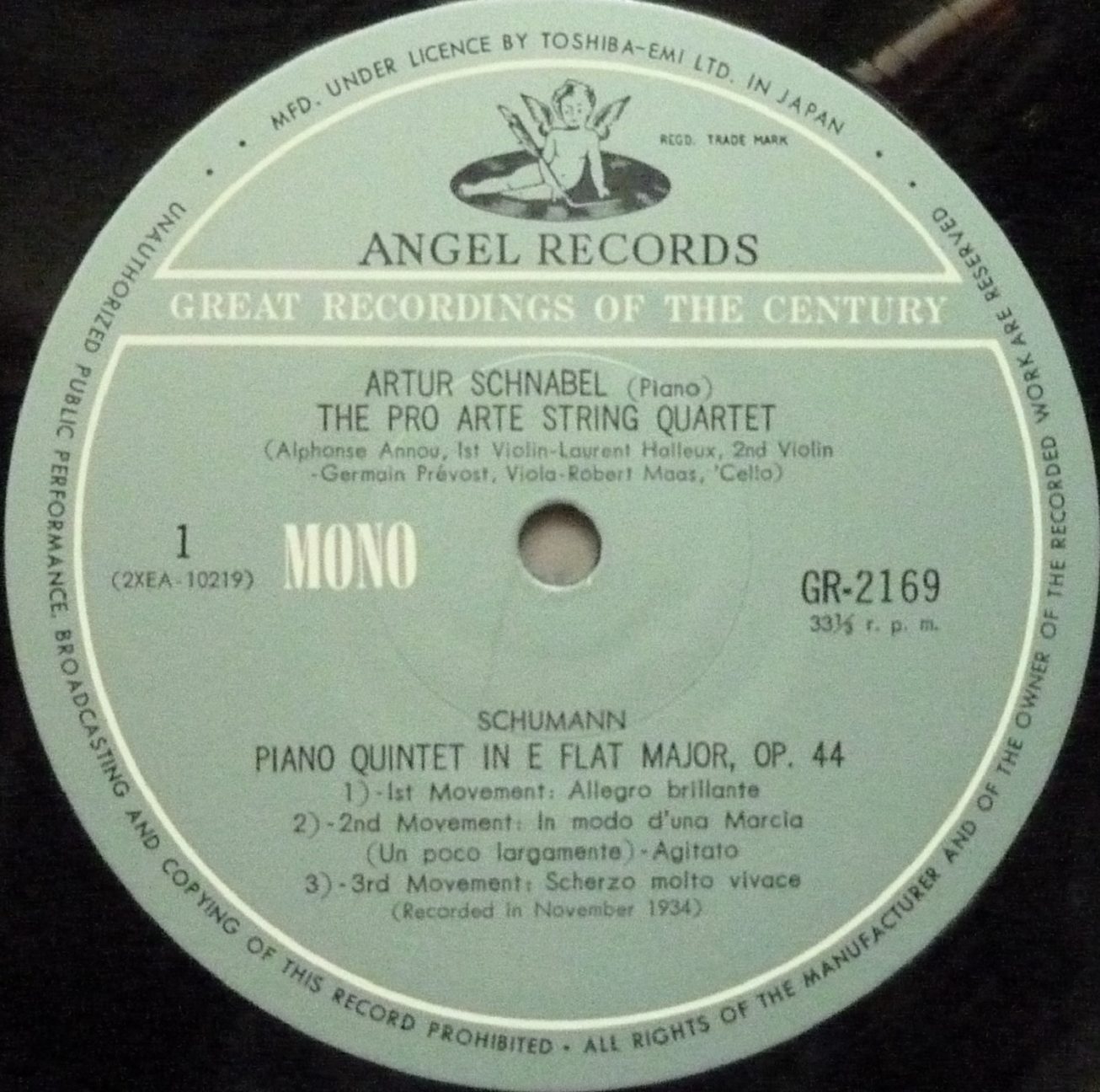
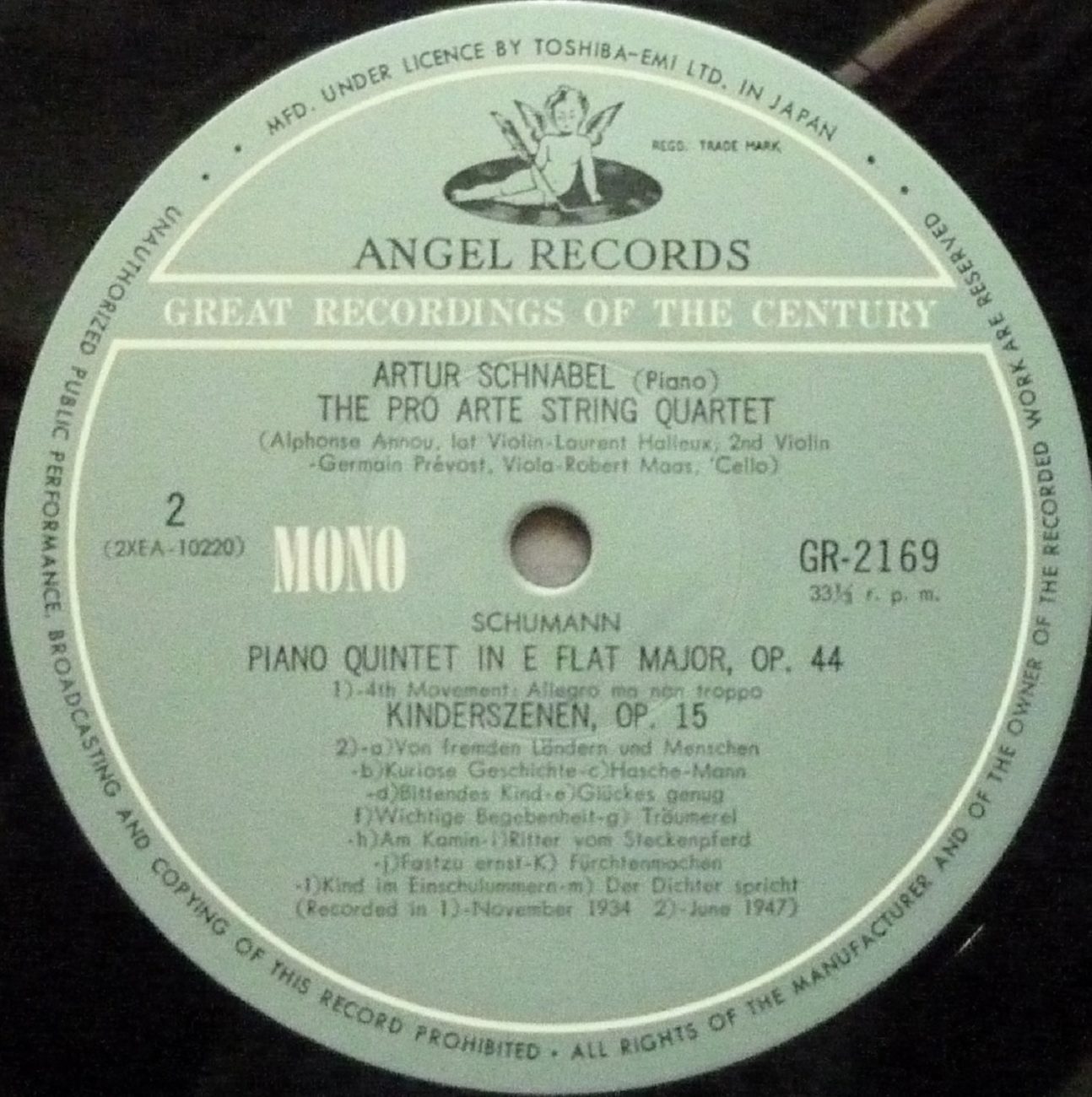
Artur Schnabel has made only two commercial recordings of the music by Schumann, only this Piano Quintet and the Kinderszenen. We have two live recordings of the Piano Concerto, one with the NYPO and Pierre Monteux, and one with the LAPO and Alfred Wallenstein. In his recitals, he rarely performed works by Schumann (Davidsbündlertänze Op.6 et Fantaisie Op.17).
In 1975, when BWS isued the LP with the recording of the Concerto with Alfred Wallenstein, the pianist’s son Karl-Ulrich dismissed it as a counterfeit. However, a complete recording of the concert exists with the radio announcements (it is available as a mp3 on the Internet), and Schnabel describes the very peculiar conditions in a letter dated Mars 5, 1945 to his friend and confidante Mary Virginia Foreman:
‘ Last night was the first concert in Glendale. It was the Standard Oil West Coast hour. They cheated me by not telling me this, and I played for the same fee as for the other concerts, when nobody except the people in the hall can hear the performance. I am, fortunately, now old enough not to get fussy or angry. The concert – if one could call it that – was just barbarous. Rehearsal at 4.30pm. I accordingly played tne Schumann three times within four hours. The Standard Hour has to stuff sixty minutes with music. It did with: Hansel and Gretel Overture, Prize Song by Wagner (no singer), Schumann Concerto, Dukas’ Apprentice – and words for latecomers. The place, an over-resonant barn.’
If Schnabel’s playing is here unusual to the point of having puzzled his own son, it seems to be due to the lack of rehearsal time which did not allow a coordination between the two musicians and to the rather hard and undifferenciated rendering of the score by Wallenstein, which however has the advantage of bringing a permanent tension (or ‘Schumann fever’ if you will) to the musical discourse, which seems to be lacking at times in the more conventional performance with Pierre Monteux*. In other words, Schnabel plays under pressure.
The recording of the Quintette Op.44 has all the required tension, but Schnabel plays with his longtime partners of the Quatuor Pro Arte.
* Concert given only once at Carnegie Hall with the NYPO on June 13, 1943 (instead of June 27), with a single rehearsal on June 12, thus hardly better conditions than in California 2 years later.
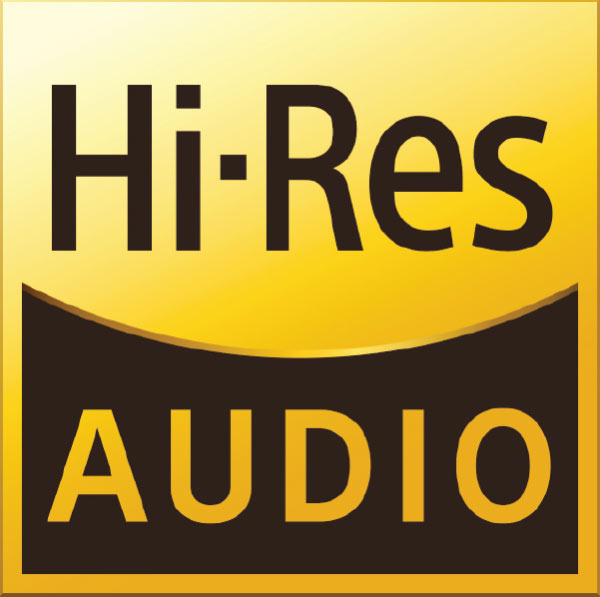
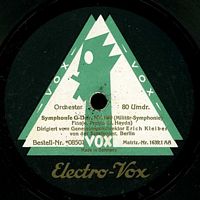
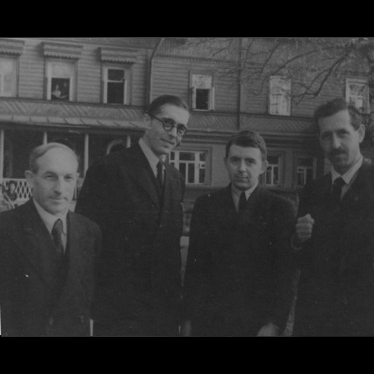
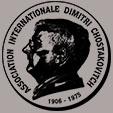
4 réponses sur « Schnabel – XI – Schumann: Quintette Op.44 (Quatuor Pro Arte) – Concerto Op.54 (LAPO Wallenstein) »
HD/Hi-Res (24 bits/88 KHz):
https://e.pcloud.link/publink/show?code=kZUMd8Zhm4KSEYMcTYlaCHVFgGuAX3capgk
Format CD (16 bits/44 KHz):
https://e.pcloud.link/publink/show?code=kZoxd8ZphI8Ynj2Ek4DB8oLRmOQ4Q9Cy3zy
Concert Schnabel LAPO Wallenstein: Concert Complet mp3 / Complete Concert mp3:
https://oildale.s3.amazonaws.com/wp-content/uploads/2014/10/22110406/L.A.-Phil.-Wallenstein-Schnabel-March-4-1945.mp3
Thank You 🙂
Wow another delicious treasure! Thank you!!!
Ron
EPILOGUE
Pour son unique concert au Festival de Lucerne (Luzerner Festwochen) le 21 août 1948, Schnabel a programmé le Concerto de Schumann. Le concert, avec l’orchestre du Festival, était dirigé par Volkmar Andreae (Weber Freischütz Ouv; Schumann Concerto Op.54 – Brahms Symphonie n°3).
Le lendemain, il a écrit à Mary Foreman depuis Londres: ‘Le concert était très bon. Splendide orchestre, composé des meilleurs instrumentistes de tous les orchestres suisses. Piano accommodant. Parmi le public, Furtwängler, Edwin Fischer, Backhaus, et beaucoup d’autres musiciens de renom. Tous chaleureux , et de manière convaincante, au sujet de ma musique. Ce que j’entends le plus de leur part est leur étonnement que l’ ‘Amérique’ ne l’ait pas dégradée, comme elle l’avait fait, à leur avis, de tous ceux qui sont venus sous son influence. Je leur raconte toujours que, contrairement au ‘vieux monde’, ce qui représente publiquement et bruyamment les U.S.A. ne sont pas ses meilleurs efforts et réussites, mais plutôt le contraire. Il existe un autre ‘U.S.A.’ qui est relativement inconnu, qui ne fait pas l’objet de publicité, qui n’est ni exporté, ni vendu, et que l’on apprend à connaître seulement en vivant sur place.’
Les critiques suisses ont peu apprécié le jeu de Schnabel. Pour la ‘Gazette de Lausanne’, Schnabel ‘a écarté résolument la passion et joué un concerto charmant dont le flot clarifié coulait avec une limpidité sans pareille’, alors que par ailleurs Henri Jaton, dans la ‘Nouvelle Revue de Lausanne’, y a trouvé ‘une nuanciation sans cesse dominée par la force, sans la moindre effusion lyrique et un académisme totalement hors de saison’.
_________________________________________
For his only concert at the Lucerne Festival (Luzerner Festwochen), on August 21, 1948, Schnabel performed Schumann’s Concerto. The concert, with the Orchestra of the Festival, was conducted by Volkmar Andreae (Weber Freischütz Ouv; Schumann Concerto Op.54 – Brahms Symphony n°3).
The next day, he wrote from London to Mary Foreman: ‘The concert was very good. Splendid orchestra, composed of the best players of all Swiss orchestras. A tractable piano. Furtwängler, Edwin Fischer, Backhaus, and many others noted musicians in the audience. All of them convincingly warm towards and about my music. What I mostly hear from them is the astonishment that ‘America’ has not done harm to it, as it had, in their opinion, to all the others coming under her influence. I always tell them that, in contrast with the ‘old world’, what represents publicly and noisily the U.S.A. are not her highest endeavours and achievements but rather the opposite. There is another ‘U.S.A.’ which is comparatively unknown, neither advertised, nor exported, nor on sale, and which one learns to know only living there.’
The Swiss music critics did not like very much Schnabel’s playing. For the ‘Gazette de Lausanne’, Schnabel ‘resolutely dismissed the passion and performed a charming concerto, of which the clarified musical flow went with a matchless limpidity’, whereas otherwise Henri Jaton, in the ‘Nouvelle Revue de Lausanne’, heard ‘a way of shading always dominated by strength, without any lyrical outpouring and a totally inappropriate academism’.